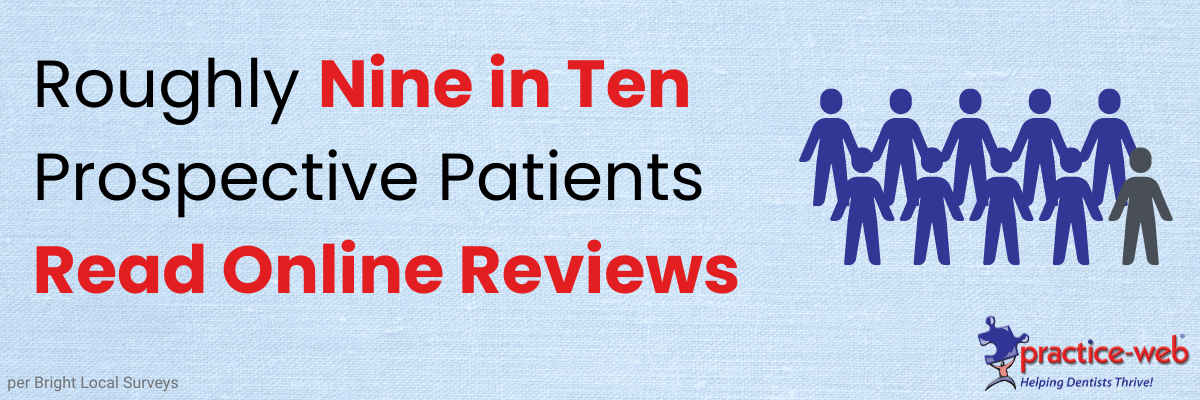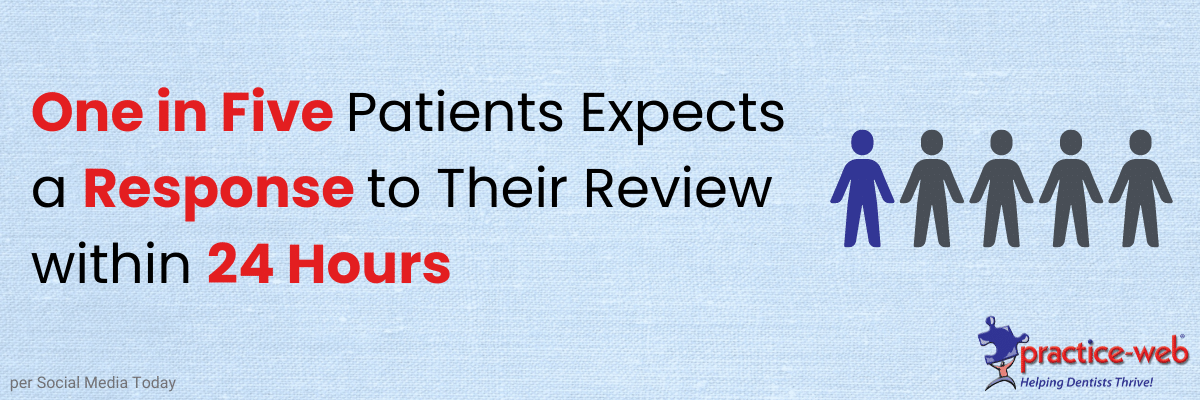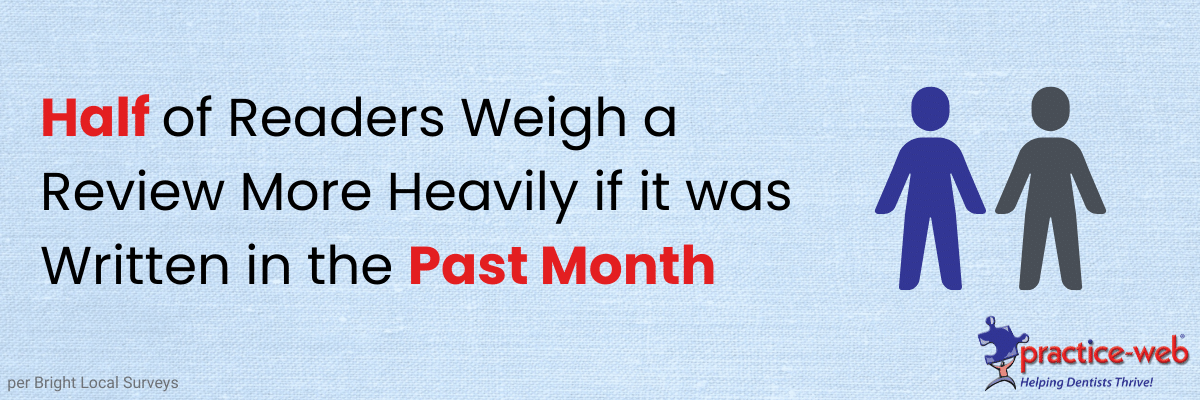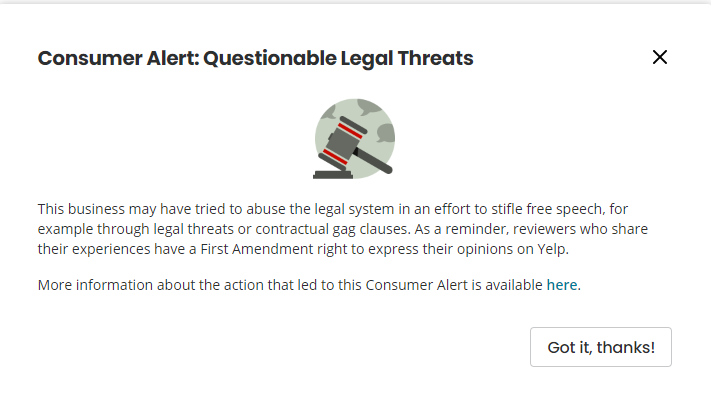Every dentist will get bad reviews at some point or another. No matter how great you are or how well-run your practice is, someday someone will take to the keyboard and say something that damages your reputation.
It hurts—especially when you know you did everything you could for that patient or would have made adjustments if only you’d known they were dissatisfied when they were in the office.
Or, maybe you’re looking at the review and are certain the person isn’t your patient. Or, maybe you feel the person is simply being vindictive? Perhaps outright lying for unknown reasons?
Take a deep breath and relax. This will pass and your practice can come out stronger in the end, but you’ll need to manage the situation carefully.
Why Online Reviews Matter
We talk about the benefits of online reviews quite a bit. They’re an essential component of dental practice marketing. They impact how many people find you in search results, and nearly nine in ten prospective patients will read your reviews before booking their first appointment. Each star is worth a nine percent revenue boost too. In other words, online reviews directly impact the number of new patients you attract and, therefore, your practice profitability.

How to Handle Bad Reviews
More than two-thirds of people will consider leaving a review after a positive experience according to Bright Local surveys, while less than half will consider leaving one after a negative experience. That means even if you do nothing at all to manage your online reputation, you’ll eventually receive a mix of good and bad feedback online. These tips will help you deal with the bad reviews and make the most of the positive ones.
1. Be Mindful of HIPAA
First and foremost, HIPAA guidelines mean your practice cannot disclose any protected health information (PHI) online. Ultimately, whether you’ve violated HIPAA guidelines will be determined by the Office for Civil Rights (OCR), a court, and/or your state dental board, but suffice it to say, many practices err on the side of caution and don’t even acknowledge whether someone is a patient or not when replying to reviews.
At a bare minimum, you should not disclose any information about a patient’s treatment or conditions. Even if the patient brings up their own care in the review, do not engage in a discussion about it. If you have questions about what you can safely disclose, consult an attorney.
Failure to follow HIPAA guidelines can result in massive fines for your practice. The fallout from an unlawful disclosure, including loss of reputation, can be so damaging to practices that they wind up closing their doors forever.
2. Have a Crisis Management Plan in Advance
Most online reviews can be managed by the office manager or another practice representative assigned the job. However, it’s helpful to have a written policy in place about how to handle challenging reviews. For example, you may want to note:
- At what point the dentist needs to be notified of the review.
- Pre-approved phrases you can use to diffuse a situation.
- What power the practice representative has to correct the situation.
- At what point you should consult your attorney. (For example, if a patient is making malpractice claims, it may make sense to get your attorney’s assistance right away.)
3. Stay Calm, Cool, and Professional
People tend to get into dentistry because they care deeply about the welfare of others. It’s hard not to take it personally when someone says something negative about your life’s work and passion. However, you absolutely must not react emotionally to the situation.
If you’re upset and want to respond, go ahead and draft your response in a Word Document or on paper. Come back to it and edit or rewrite it after you’ve had a chance to cool down. You probably won’t regret waiting but you’ll almost always regret a response posted in frustration or anger.
4. Know the Triggers
The best way to deal with a bad review is to avoid getting a bad review altogether by focusing on creating positive experiences for your patients. Negative reviews tend to center on one or more of the following common themes:
- Money: “I was billed incorrectly.” “They quoted me too much.” “My insurance wasn’t billed or wasn’t billed correctly.”
- Long Waits: “I sat in the waiting room for 30 minutes.” “The dentist ignored me while seeing other patients.”
- Lack of Procedure Info: “I didn’t really need treatment.” “I was given a huge list of treatment needs that I didn’t understand.” “They just wanted my money.”
- Unprofessionalism: “They were too rough.” “They talked about me when they didn’t think I could hear them.”
While some of these concerns can only be addressed through strong clinical skills, most are communication problems. For example, a complaint about being prescribed unnecessary treatment generally means the patient didn’t understand their condition. Spending additional time on education while presenting treatment plans eliminates the issue and boosts case acceptance too. The same is true for most money concerns. When a patient understands their condition and knows their options, you’ll rarely hear anything other than questions about how to handle payment.
5. Monitor Your Online Reputation
One in five patients expects a response to their review within 24 hours according to Social Media Today, while one in four say up to three days is ok. More than half expect a response within a week.
More than half of all review readers expect to see responses from the practice too, per Bright Local surveys. This is true of both positive and negative reviews, but the impact of a response is greater when the review is negative.
Because of this, it’s important to constantly monitor your online reputation. A service like Practice-Web’s pwReviews makes it easy to keep tabs on review sites. You can also set up Google Alerts to monitor the web for mentions of your practice and the dentist’s name.

6. Report False Reviews
Sometimes patients will erroneously leave bad reviews for a practice or dentist with a name that’s similar to one they visited. Other times, competing practices, unhappy former employees, or non-patients who have a personal issue with someone at the practice will leave fake reviews as well.
Thankfully, most review sites have a way to report these false reviews. Use the reporting feature and leave a polite response for the sake of readers. Something akin to, “I’d like to discuss this issue with you but don’t see a record of your visit. Can you please call us at…?”
Or, if the person is complaining about a service you don’t offer or something you don’t do in general, you can say that in your response to eliminate credibility. For example, “We don’t offer traditional braces at our practice, so it’s unclear if you might be referencing a different practice or another service. I’d like to discuss this with you though. Please call us at…”
7. Reply Appropriately
All reviews, both positive and negative, should get a response. As you draft yours, make sure it’s:
- Timely: Don’t let reviews sit for more than 24 hours without a response.
- Authentic: Be genuine. People can tell if you don’t really care.
- Original: Although you can and should have a selection of “canned” responses, make sure each response you give is personalized. For example, you can use the person’s name if it’s already on the review or reference something they said.
- Thankful: Always thank the reviewer. In cases where it’s a positive review, a simple “thank you” is fine. With negative ones, you can say things like how you appreciate their time or how you appreciate them bringing something to your attention.
- Empathetic: Put yourself in the mind of the patient and remember many of them are coping with anxiety and budget issues. They may not understand why something was necessary or why certain processes are the way they are. Coming to the dentist can be stressful for some people no matter how great you are. When you respond with these things in mind, your compassion will show in your words.
8. Move the Conversation Offline
Engaging with an upset reviewer online will almost always blow up in your face even if you have the best of intentions. Your goals for your response to a bad review should be:
- Diffuse/ Empathize: “That’s not the experience we strive for.” “I’m sorry you feel this way.” “I want to hear more about your experience.” “I want to address your concerns.”
- Move the Discussion: “I will call you later today to discuss this.” “I left you a message to discuss this.” “Please call me to discuss this at…”
With this approach, you show readers and the patient that your practice cares about the patient and the review, but you don’t open yourself up to further reputation damage.
9. Correct the Problem
Bad reviews are an opportunity to learn, improve how your practice operates, and enhance the patient experience. Address the patient’s immediate concern whenever possible and explore ways your practice can avoid having similar complaints in the future.
10. Increase Good Reviews
People don’t generally read a negative review and then swear off the practice altogether. They take in lots of information before making a decision. For example, 55 percent consider your response and 49 percent care whether the review was posted within the past month per Bright Local. They look at your overall star rating and your other reviews too.
Because of this, you can help negate the impact of a bad review by increasing the number of recent positive reviews too. Some practices simply ask happy patients to leave reviews. You can use a tool like pwReviews to automatically ask patients for reviews after their appointments, so you start getting more without any extra effort.

11. Vet Reviewers
Again, all practices will get a bad review at some point in time or another. However, sometimes people worry that, when they start asking for reviews, they’re going to dramatically increase the number of bad reviews they get too. That’s not necessarily true—especially if you’re addressing the common triggers covered above and using the feedback you receive to improve processes.
Even still, if your practice is worried about getting more bad reviews, just choose who you request reviews from. With pwReviews, for example, you can send them a prequalification survey. Patients who report being happy after their visit will then receive an invitation to review you on a third-party website and anyone else simply has their feedback held for internal review. That way, you can address their concerns privately.
What NOT to Do When You Get Bad Reviews
You should feel comfortable addressing bad reviews at this point and know which steps to take. However, sometimes practices unintentionally make missteps while they’re applying best practices. Below, we’ll cover a few things practices sometimes do that sabotage their good efforts.
1. Bribe Patients to Change Reviews
Sometimes practices try to incentivize a patient to remove their bad review. Be aware that this is against the policies of most review sites and can cause issues. Yelp, for example, will post a public notice on your profile that you’ve violated their policies and how. But, even if the review site doesn’t find out and react, the patient may post something about it or will, at the very least, likely become upset.
2. Create Fake Reviews on Behalf of Your Practice
Sometimes people ask employees, friends, and family to leave reviews or they’ll create fake accounts to try to get more positive reviews. Again, this typically violates review site policies and may result in a public notice of your indiscretions. Plus, prospective patients usually see through fake reviews. They notice when different reviewers use the same language, when reviewers only have one review, and other telltale signs. Doing this undermines any authentic good reviews and can cause lasting damage to your online reputation.
3. Make Threats
Public threats about refusing to see someone in your practice, filing a lawsuit, or otherwise attempting to intimidate someone into removing a bad review is not likely to get them to remove their post but it will put off any prospective patients who read your message.
4. Ignore Them
The impact of a bad review will usually fade eventually, but it’s still not a good idea to ignore them. When people see compassionate and concerned responses to negative reviews, it can actually increase the likelihood that they’ll call to book.
5. Create Patient Policies That Disallow Bad Reviews
Some offices try to get around bad reviews by making patients sign a waiver that they won’t say anything negative about the doctor or practice. This is another area that Yelp specifically addresses and the review site will actually announce that you’re trying to silence reviews by putting a warning on your profile.

But, even if you’re not worried specifically about violating a review site policy, bear in mind patients will speak publicly about your policy. Even if you’re not hiding anything and deliver great care, it will make it look like you’re hiding something and you’ll miss out on prospective new patients.
6. Ignore Ownership
If your practice genuinely did or did not do something that impacted a patient’s visit, own up to it. For example, if someone got an incorrect bill, it’s ok to explain that you made a mistake and that you’ve taken steps to avoid similar issues in the future. Doing so will give the patient more faith in your practice and the patient may choose to remove the bad review on their own after their issue is resolved.
Be aware, however, that you should be careful about how and when to admit fault and how your words may be construed. For example, if a patient complains that staff was rough or that they were in pain after, a response of, “I’m sorry,” could actually be taken as an admission of fault which can have legal implications. Instead, you’ll want to say something along the lines of, “The doctor would like to speak with you about this. Please call us…” or “The doctor will call you later this morning to discuss this. If he doesn’t catch you, please be sure to call us right away so we can address this.”
Take Control of Your Online Reputation
If you’re using pwReviews and need help setting it up to meet your needs, please contact our support team. If you’re interested in automating your reviews, get in touch with our sales team and we’ll walk you through how pwReviews works.

